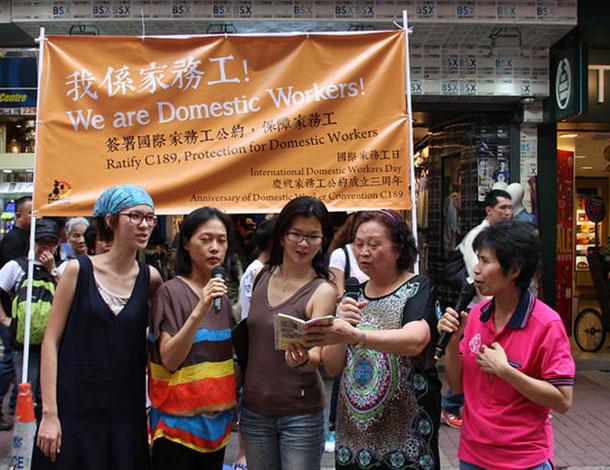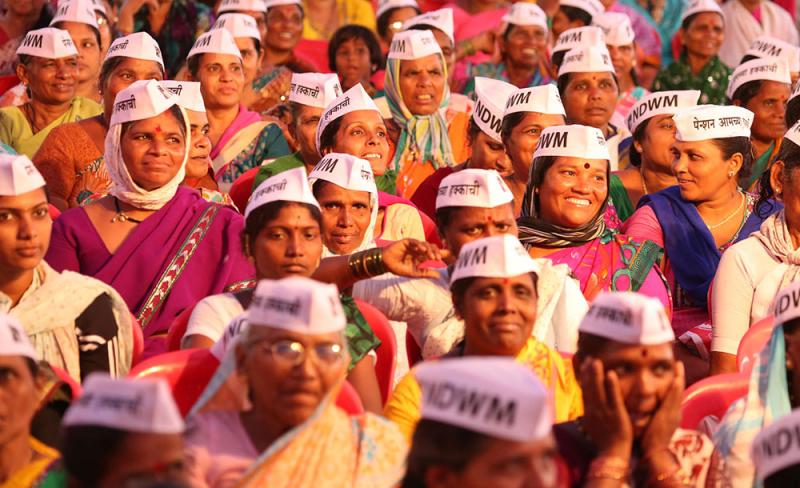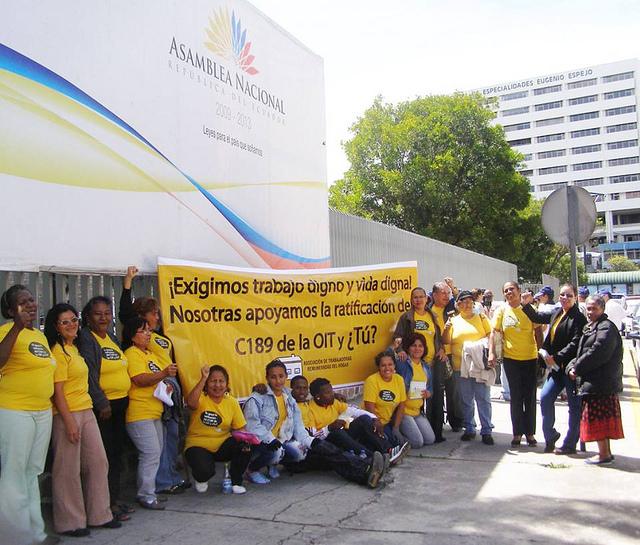The fight for the rights of domestic workers has been a global struggle for decades. In December 2016, the government of the United Arab Emirates’ announcement that it would transfer oversight for the recruitment of domestic workers from the interior ministry to the labour ministry was cautiously welcomed by human rights groups, but within the Middle East region, the call to extend labour laws to cover domestic work, and to legalize the unionization of domestic workers continues.
At a time when the experiences and demands of domestic workers are often narrated by others, Beirut-based, Filipina domestic worker Ursula Cruz tells her own story.
Poverty led me here.
I came to Beirut in 1993 as a domestic worker. Before that, I was a day care worker in a rural part of the Northern Philippines, earning a very humble honorarium. I had three children to support, whose future I needed to secure. That was the main reason I decided to work overseas, believing that the grass is always greener on the other side of the fence.
I was lucky enough to end up working for a good family in Beirut, Lebanon. My employers did not prevent me from expressing my feelings and opinions. My rights were always respected. At the same time, performing my duties and tasks as a domestic worker was not hard because I had grown up doing household chores such as cooking, cleaning and taking care of my siblings. I excel in this profession.
But while I was satisfied with my working and living conditions, there was always an emptiness I felt inside. Although my employer allowed me to go on vacation every six months, something important was still missing.

In response, I started volunteering at the Philippine Embassy as a community mobilizer to help distressed Filipino workers. On my days off, I organized sports events with PhilBaLL (Philippine Basketball League in Lebanon). In 2006, during the war between Lebanon and Israel, I was part of the rescue team and served at a shelter, where I saw with my own eyes how many domestic workers were at risk - not only fellow Filipinos but also domestic workers of other nationalities. This was when I decided to go beyond the Filipino community.
Current status of Migrant Domestic Workers in Lebanon
There are more than 300 thousand migrant domestic workers in Lebanon, many of whom live with unjust living and working conditions. But the Lebanese Labour Code does not cover any of the rights of migrant domestic workers.
As a result, there is rampant verbal, physical and sexual abuse, financial exploitation, mental torture, and false accusations such as theft. Many migrant domestic workers suffer from food deprivation. These conditions have been normalized due to a lack of legal protection. If and when they are reported, deaths resulting from these conditions are described as suicides.
Many conditions play into the exploitation of migrant domestic workers. Most of us are women, and some of us are illiterate. At times, this illiteracy furthers the already existing exploitation, embedded in sexism, classism and racism in our home countries. Migration renders us even more vulnerable.
In fact, the vicious cycle often begins in our home countries, where traffickers attract domestic workers and facilitate their migration for a commission. The traffickers profit from domestic workers, and once we are ‘sold’, the host family profits from our labour. Employers sometimes withhold workers’ salaries for leverage, to belittle us, or because they think it is not urgent because we have no bills to pay since we are living in their homes. At the same time, many employers think that since we opted for migration, we must have had nothing to do in our countries, or were not qualified, or lacked opportunity, and that we therefore owe them for ‘saving’ us.

Creative and Organized Resistance
In any instance of life, there are certain people who will benefit from the turn of events, no matter how negative. It is obvious that there is resistance to changing the laws surrounding the rights of migrant domestic workers, because there are people who keep getting richer on our backs. But at the end of the day, it is always women domestic workers that pay. Discrimination can be addressed with the adoption of proper laws, which would influence behaviour and uphold the rights of migrant domestic workers.
Other forms of resistance take place through education and awareness as a tool for survival, such as accessing language courses offered by NGOs, so that workers can at least understand documents that they are signing, such as waivers and contracts.
It can also come in the form of making international connections, like attending international events such as the International Domestic Workers Federation (IDWF) 1st Congress, and the UN-CSW earlier this year. These gatherings give us the courage to share and tell our untold stories to the whole world. In these spaces, we hope to shed light on the problems, struggles and challenges to accessing justice and fair working and living conditions in Lebanon.
And finally, we are organizing ourselves in collectives, unions and alliances, so we can be prepared to fight for our rights, for that moment of desired freedom. The saying goes that one hand alone doesn't clap. Yet, when you have both, you will make noise. So, if I am alone in demanding my rights, whether my paycheck or my vacation or my insurance, I am considered an exception and no one will hear me. But if we are two or three and growing, and if we start screaming, one person might hear us, and then a second and a third, and it will snowball from there.

And who knows, one day: BAM! The authorities will decide that they have had enough hearing our cries and we will win back our rights.
Of course, the deportation of our comrades is a threat to everyone and we are not exempt. But we are a group of women who share one voice, because we all undergo similar problems, and we have all had enough of the way things are. Things must change now, like the modern-day slavery of the kafala system, and the ratification and implementation of the ILO 189 Convention for Domestic Workers. We trust each other and we are ready to walk the whole distance although we know that it will be a rocky road. It is not the number of members that counts at this stage. We are small but we are very active.
Poverty may have led us here, but this alliance brings us strength. It is our sweat and blood, our lives. It is what will drive us forward, paving the way for better protection and lives for our thousands of sisters and brothers. So that the next generation, or parents like me, can fulfill their responsibilities and dreams for their children.
